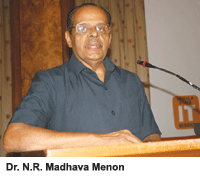A consultation meeting called by a Central government appointed task force to discuss the draft National Commission for Higher Education and Research (NCHER) Bill, held in Anna University on February 17, has left representatives of Tamil Nadu’s 29 deemed (private) universities, 400 private engineering and 450 arts and science colleges fuming with anger and resentment. Only government university vice chancellors were invited to meet with the task force, with representatives of the state’s privately promoted higher education institutions conspicuous by their absence.
Given that Tamil Nadu has 29 deemed universities as against only 19 government varsities, over 400 private engineering colleges (cf. only nine government engineering colleges) and over 450 private arts and science colleges, all important stake-holders in higher education, private varsities are interpreting their blatant exclusion as an attempt to restrain them from having any say on the Bill, and higher education reforms. The sole representative of deemed varsities, S.Vaidhyasubramaniam, dean of planning and development at SASTRA University, invited himself to the meeting.
The draft NCHER Bill, which was presented for public debate on February 1, proposes replacement of the University Grants Commission (UGC), All India Council for Technical Education (AICTE) and National Council for Teacher Education (NCTE) by the powerful NCHER which will take over all the functions of these sidelined higher education authorities including licensing, monitoring academic and governance standards, disbursing grants and appointing vice chancellors. The draft Bill envisages a powerful regulatory and supervisory NCHER comprising seven members headed by a chairman appointed by the President of India on the recommendation of a selection committee including the prime minister, speaker of the Lok Sabha, the leader of the opposition, among others.
At the consultative meeting, the draft Bill was predictably opposed by the Tamil Nadu government and vice chancellors of state government universities as an infringement of the state government’s authority in higher education. According to higher education minister K. Ponmudy, it would be impossible to implement a uniform system as envisaged by the NCHER Bill, given the diversity in languages and the need for differential social justice legislation in the states.
The state government’s opposition to the NCHER Bill hasn’t surprised anybody given that it has been controlling admission procedures, fee structures, decreeing caste quotas and micro-managing higher education institutions in Tamil Nadu for decades. Now with all these powers and responsibilities proposed to be vested in the NCHER, Tamil Nadu’s politicians and compliant state government-appointed vice chancellors fear massive loss of power and patronage in higher education.
Therefore Ponmudy has given the ruling DMK party’s opposition to the all-powerful NCHER a Centre-state autonomy spin. “The Centre is infringing on the states’ rights on education. It is only after education was moved to the concurrent list in 1976 that it has become a commercial activity and private interests are playing a larger role. This is reflected in the current problem with deemed universities,” says Ponmudy.
 However academics in the state and beyond have been quick to see through this argument. Writing in Chennai’s favourite daily The Hindu (February 22) and responding to the charge of centralisation of power in the proposed NCHER, Dr. N.R. Madhava Menon, the legendary legal educationist and founder-director of the National Law School at Bangalore, West Bengal University of Juridical Sciences, Kolkata and a member of the visiting task force says: “The Yash Pal Committee recommended that the key reform needed is restoring the autonomy of universities (not the autonomy of the state governments, which is the function of the Constitution) by avoiding multiple regulators and preventing politicisation of university administration. Autonomy of university involves autonomy from Central and state governments as well. Many ills of higher education at present can be traced to political manipulation and corruption in the appointment of vice chancellors.”
However academics in the state and beyond have been quick to see through this argument. Writing in Chennai’s favourite daily The Hindu (February 22) and responding to the charge of centralisation of power in the proposed NCHER, Dr. N.R. Madhava Menon, the legendary legal educationist and founder-director of the National Law School at Bangalore, West Bengal University of Juridical Sciences, Kolkata and a member of the visiting task force says: “The Yash Pal Committee recommended that the key reform needed is restoring the autonomy of universities (not the autonomy of the state governments, which is the function of the Constitution) by avoiding multiple regulators and preventing politicisation of university administration. Autonomy of university involves autonomy from Central and state governments as well. Many ills of higher education at present can be traced to political manipulation and corruption in the appointment of vice chancellors.”
Although they are unwilling to say so for the record, quite obviously promoter-directors of deemed universities and private sector colleges agree with this viewpoint. That’s probably why they weren’t invited to the meeting with the visiting task force to discuss the NCHER Bill, which will free them from the stranglehold of too-proximate state government politicians and bureaucrats.
Hemalatha Raghupathi (Chennai)